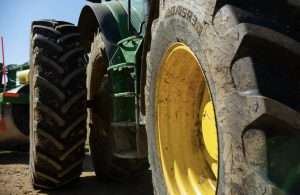ceat-speciality:blogs-tags/all,ceat-speciality:blogs-tags/tire-advice
5 Secrets You Need to Know Before Purchasing Farm Tractor Tires
Sun, 23 Oct 2022 | PRODUCTS
Farm tractor tires represent a significant portion of a farm’s operating budget. Be aware of these five secrets before purchasing your next tractor tires:
- The farm tractor tire’s inflation is okay as long as it does not have a big bulge. You cannot confirm a radial tire’s proper air inflation through a visual check. This is a myth from the bias tire days when any kind of sidewall bulge meant the bias tire was low on air. Radial tires must have a certain bulge in order for the tire to deliver optimum traction and the overall performance intended by the tire manufacturer. You cannot confirm a radial tire’s proper air inflation through a visual check. Consult with your tractor/tire dealer and check the tire manufacturer’s databook and load range table. The radial’s superior performance is realized only with proper inflation.
- You get what you pay for in farm tractor tires. When you buy the most expensive farm tractor tire, you will most likely get a good quality tire. But you must compare the acquisition price with the tread wear and overall performance achieved to ascertain the true total cost of ownership (TC0) of that tire. This is the only meaningful metric on tire value. For instance, if a particular brand tire costs half the price of the most expensive brand but delivers 80% of the operating hours and comparable performance, then the less expensive tire is delivering a better TCO by 30%. CEAT farm tractor tires, such as the FARMAX R80, are gaining rapid acceptance from North American farmers because they deliver a superior TCO. CEAT farm tractor tires deliver the latest tire technologies at a more affordable price.
- The dealer (tractor or tire dealer) doesn’t always set the tires to the proper inflation when the tractor or tires are delivered to the farmer. New farm tractor tires are normally inflated to 30 psi when shipped from the factory to minimize bouncing on the trailer. Dealers may overlook reducing the tire pressures or may not reduce the pressure to the proper level for the load on the axle. Also, tire changers often inflate the farm tractor tire to 35 psi to set the tire beads on the rim. The farmer must take the initiative to ensure that the pressure matches the load on the axle by double checking with the dealer and consulting the tire databook and load range tables
- Bias tires might be the right option but they do not provide the benefits of radial technology. If you want the best traction, larger footprints, reduced compaction, a better ride, or any of the above, you need to go with radials. Bias farm tractor tires do not deliver these improved features due to the carcass design.
- R1 tractor tires are great for everyday farm chores, performing decently in muddy fields and dirt –but they are not as capable in the snow or deep mud and clay. The R-1W farm tire, like the FARMAX R70, has more aggressive tread; the W (wet) in the name signifies its ability to perform tasks in deep mud or clay and snow. This ability comes from a 25 percent deeper cleat compared to the R1 tire.
CEAT farm tractor tires deliver the latest technologies, such as IF/VF, to farms and ranches of all sizes. Talk to your local tire dealer about CEAT and find out why so many farmers are going with the CEAT brand.











































